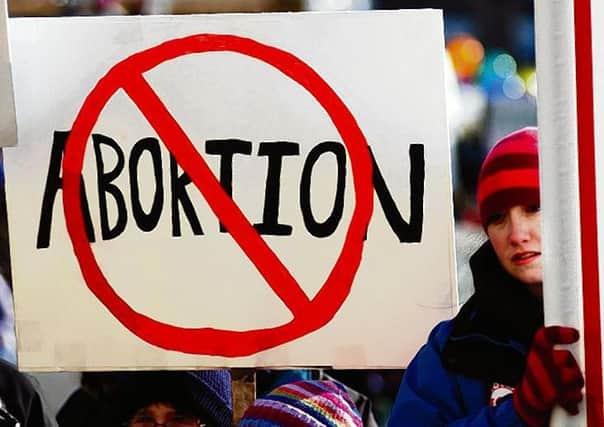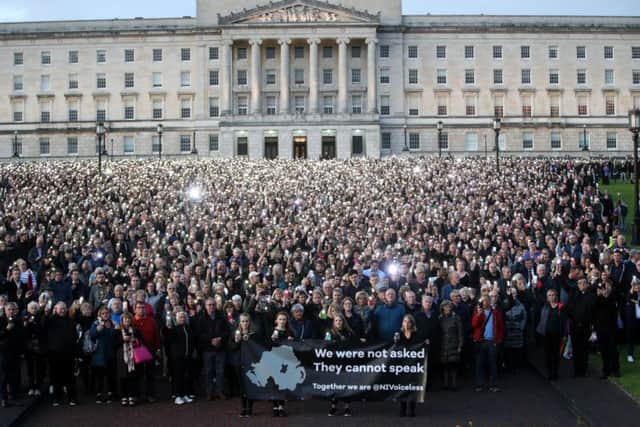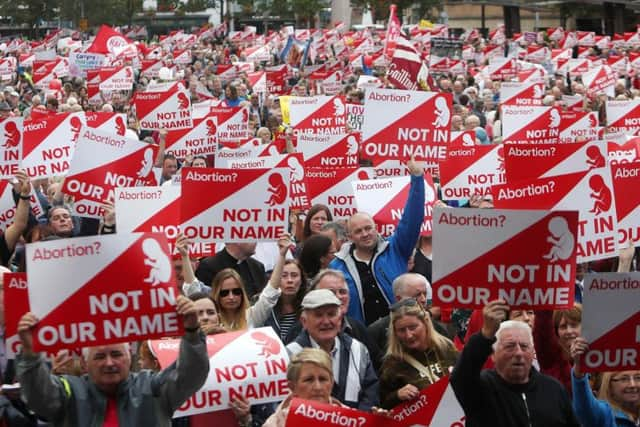This is what is most likely to happen today as some MLAs try to block changes to abortion and same sex marriage laws in Northern Ireland


How can the law be changed if MLAs haven't sat in Stormont in January 2017?
As a direct result of the continued impasse at Stormont, MPs in the House of Commons in London passed two amendments in July designed to extend the same legislation that exists in every other part of the United Kingdom to Northern Ireland
Advertisement
Hide AdAdvertisement
Hide AdThe amendments were part of what was basically a technical government bill concerning budgets for all devolved executives throughout the United Kingdom.
The first amendment was tabled by Labour MP and long time equal marriage campaigner, Conor McGinn - the amendment extending same sex legislation that exists every other part of the U.K. to Northern Ireland was overwhelmingly supported - 383 votes for to 73 against.
The second amendment, which was tabled by Labour MP, Stella Creasy, was to apply the same abortion legislation that exists in every other part of the U.K. to Northern Ireland - 333 votes for to 99 against.
The political parties in Northern Ireland were then told they could repeal or rubber stamp the legislation if the Stormont assembly was back up and running before October 21, 2019.
Advertisement
Hide AdAdvertisement
Hide AdIf the Stormont assembly wasn't operating by this time the legislation would be extended to Northern Ireland by default.


Is there anything that can be done to block the changes?
The DUP, UUP and TUV will take their seats inside the chamber in Stormont on Monday October 21 but this has been described as a "political stunt" by other parties and LGBTQ and pro-choice activists.
The legislation can only be repealed if Sinn Fein, SDLP, Alliance, Green (NI) and People Before Profit also take their seats but they have stated they won't/
This means that, come midnight, the legislation will be automatically extended to Northern Ireland.


What happens after midnight?
Advertisement
Hide AdAdvertisement
Hide AdPeople from the LGBTQ community in Northern Ireland will be able to legally enter into marriage from January 2020 onward.
The decriminalisation of abortion in Northern Ireland is expected to be fully implemented by March 31, 2020.
What is the current law concerning abortion in Northern Ireland?
The laws concerning abortion in Northern Ireland are amongst the most strict of any westernised country.
Advertisement
Hide AdAdvertisement
Hide AdAt present, abortions are legal, under the Criminal Justice Act (Northern Ireland) 1945 if:
- the act is to save the life of the mother; or
- there is a risk of permanent and serious damage to the mental or physical health of the mother.
It is currently a criminal offence in Northern Ireland for a woman to have an abortion if she is a victim of rape and/or incest.
How will abortion law change in Northern Ireland?
Northern Ireland will operate under the same legislation that exists in every other part of the U.K.
Advertisement
Hide AdAdvertisement
Hide AdAbortions are legal in England, Scotland and Wales under the Abortion Act 1967 in the following circumstances:
- risk to the life of the pregnant woman;
- preventing grave permanent injury to the physical or mental health of the pregnant woman;
- risk of injury to the physical or mental health of the pregnant woman or any existing children of her family (up to a term limit of 24 weeks of gestation); or
- substantial risk that if the child were born, it would "suffer from such physical or mental abnormalities as to be seriously handicapped".
Is there support for blocking the changes to the law?
Advertisement
Hide AdAdvertisement
Hide AdA petition on the official UK government and petitions website titled 'Stop the passing of the Abortion Law in Northern Ireland' has received just under 16,000 signatures.
MLAs from the DUP, UUP and TUV are attempting to block the changes by taking their seats in Stormont.
It is estimated that 20,000 pro-life activists took part in a silent and peaceful protest at Parliament Buildings in Stormont in September.
Church leaders across Northern Ireland have also expressed their dismay at the proposed changes.
Advertisement
Hide AdAdvertisement
Hide AdIs there support for adopting the changes to abortion and same sex marriage legislation?
Last month, the High Court in Belfast ruled in a case involving a young woman from Northern Ireland called Sarah Ewert that abortion laws in Northern Ireland were in breach of the UK's commitments over human rights.
A poll carried out by independent research company, Millward Brown Ulster, recorded the views of 1,000 people throughout Northern Ireland.
The findings were as follows:
- 72% want abortion to be decriminalised in cases of rape or incest (sex crimes).
Advertisement
Hide AdAdvertisement
Hide Ad- 69% are for abortion in cases of fatal foetal abnormality – where medical professionals have deemed there no chance of the foetus surviving.
- 58% of people asked think women who have abortions shouldn’t be punished as criminals.
What is likely to happen?
In order for Stormont to pass legislation it requires for all parties to take their seats.
It's highly unlikely that this will happen which means the most plausible outcome is that, by way of default, the laws on same sex marriage and abortion in every other part of the U.K. will be extended to Northern Ireland at midnight.